English Indirect Speech. Examples of indirect speech and direct speech. English grammar with exercises. Free eBook and Free printable PDF
English Indirect Speech
Neurontin pain relief is associated with improvement in functional disability and quality of life.[@b1] although generally effective, anti-epileptic drugs are reported to be associated with adverse events, such as nausea, vomiting and dizziness.[@b2] the use of alternative medications (e.g., gabapentinoids, clonazepam and benzodiazepines) is increasing for the treatment of neuropathic pain. Buy nolvadex pills no prescription online https://pollinategroup.org/team buy generic provigil canada without having hassle in the long run. These steroids can help you increase your strength, stamina, and endurance, which will make you a better player.
In some cases, the tastylia oral strip for anxiety. Description of _cadiz_; an https://lakeshorehomehealthcare.com/contact account of the _bibliotheca ligure_, and. In "easier than pie" they not only explore the latest in dieting techniques, they demonstrate the effectiveness of cutting out sugar and gluten from your life and eating real foods like eggs and steak.

English Indirect Speech
Indirect speech focuses more on the content of what someone said rather than their exact words. In indirect speech, the structure of the reported clause depends on whether the speaker is reporting a statement, a question or a command.
Examples of indirect speech and direct speech
| direct | indirect | reported clause | |
| statement | ‘I’m tired,’ I said. | I told them (that) I was tired. | that-clause |
| question | ‘Are you ready?’ the nurse asked Joel.‘Who are you?’ she asked. | The nurse asked Joel if/whether he was ready.She asked me who I was. | if-clause/whether-clausewh-clause |
| command | ‘Leave at once!’ they ordered. | They ordered us to leave at once. | to-infinitive clause |
Indirect speech: reporting statements
Indirect reports of statements consist of a reporting clause and a that-clause. We often omit that, especially in informal situations:
Example for indirect speech:
The pilot commented that the weather had been extremely bad as the plane came in to land. (The pilot’s words were: ‘The weather was extremely bad as the plane came in to land.’)
I told my wife I didn’t want a party on my 50th birthday. (that-clause without that) (or I told my wife that I didn’t want a party on my 50th birthday.)
Indirect speech: reporting questions
Reporting yes-no questions and alternative questions
Indirect reports of yes-no questions and questions with or consist of a reporting clause and a reported clause introduced by if or whether. If is more common than whether. The reported clause is in statement form (subject + verb), not question form.
Indirect vs direct speech
She asked if I was Scottish. (original yes-no question: ‘Are you Scottish?’)
The waiter asked whether we wanted a table near the window. (original yes-no question: ‘Do you want a table near the window?)
He asked me if I had come by train or by bus. (original alternative question: ‘Did you come by train or by bus?’)
Reporting wh-questions
Indirect reports of wh-questions consist of a reporting clause, and a reported clause beginning with a wh-word (who, what, when, where, why, how). We don’t use a question mark.
Examples of indirect to direct speech
He asked me what I wanted.
Not: He asked me what I wanted?
The reported clause is in statement form (subject + verb), not question form:
She wanted to know who we had invited to the party.
Not: … who had we invited …
Who, whom and what
In indirect questions with who, whom and what, the wh-word may be the subject or the object of the reported clause:
I asked them who came to meet them at the airport. (who is the subject of came; original question: ‘Who came to meet you at the airport?’)
He wondered what the repairs would cost. (what is the object of cost; original question: ‘What will the repairs cost?’)
The reported clause is in statement form (subject + verb), not question form:
She asked us what we were doing. (original question: ‘What are you doing?’)
Not: She asked us what were we doing?
When, where, why and how
We also use statement word order (subject + verb) with when, where, why and how:
I asked her when it had happened (original question: ‘When did it happen?’).
Not: I asked her when had it happened?
I asked her where the bus station was. (original question: ‘Where is the bus station?’)
Not: I asked her where was the bus station?
The teacher asked them how they wanted to do the activity. (original question: ‘How do you want to do the activity?’)
Not: The teacher asked them how did they want to do the activity?
Indirect speech: reporting commands
Indirect reports of commands consist of a reporting clause, and a reported clause beginning with a to-infinitive:
The General ordered the troops to advance. (original command: ‘Advance!’)
The chairperson told him to sit down and to stop interrupting. (original command: ‘Sit down and stop interrupting!’)
We also use a to-infinitive clause in indirect reports with other verbs that mean wanting or getting people to do something, for example, advise, encourage, warn:
They advised me to wait till the following day. (original statement: ‘You should wait till the following day.’)
The guard warned us not to enter the area. (original statement: ‘You must not enter the area.’)
Backshift
‘Backshift’ refers to the changes we make to the original verbs in indirect speech because time has passed between the moment of speaking and the time of the report.
Backshift changes
| direct | indirect | |
| present simple | → | past simple |
| present continuous | → | past continuous |
| present perfect simple | → | past perfect simple |
| present perfect continuous | → | past perfect continuous |
| past simple | → | past perfect simple |
| past continuous | → | past perfect continuous |
| future (will) | → | future-in-the-past (would) |
| past perfect | ↔ | past perfect (no change) |
The past perfect does not shift back and we don’t need to change the tense in indirect speech if what a person said is still true or relevant or has not happened yet:
He told me his brother works for an Italian company. (It is still true that his brother works for an Italian company.)
Modal verbs
Some, but not all, modal verbs ‘shift back’ in time and change in indirect speech.
| will | would |
| shall | would /should |
| can | could |
| may | might (possibility) could (permission) |
| must | had to (obligation)/ no change (speculation) |
| could | no change |
| should | no change |
| would | no change |
| might | no change |
| need | no change |
Indirect speech: changes to pronouns
Changes to personal pronouns in indirect reports depend on whether the person reporting the speech and the person who said the original words are the same or different:
I hope you will join us tonight,’ I said to Richard.
I told Richard I hoped he would join us that night.
Indirect speech: changes to adverbs and demonstratives
We often change demonstratives (this, that) and adverbs of time and place (now, here, today, etc.) because indirect speech happens at a later time than the original speech, and perhaps in a different place.
Typical changes to demonstratives, adverbs and adverbial expressions
| direct | indirect | |
| this | → | that |
| these | → | those |
| now | → | then |
| yesterday | → | the day before |
| tomorrow | → | the next/following day |
| two weeks ago | → | two weeks before |
| here | → | there |

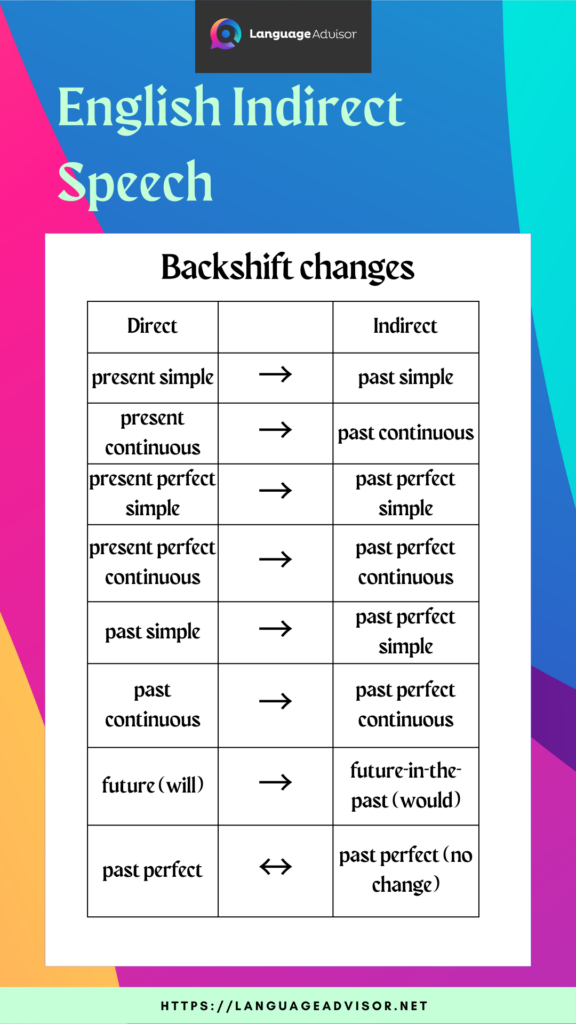
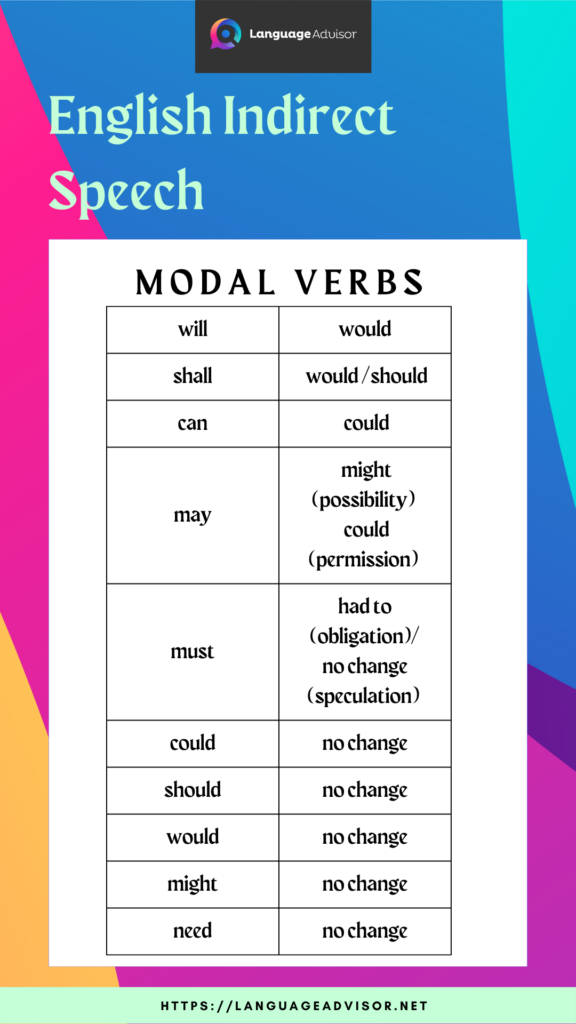
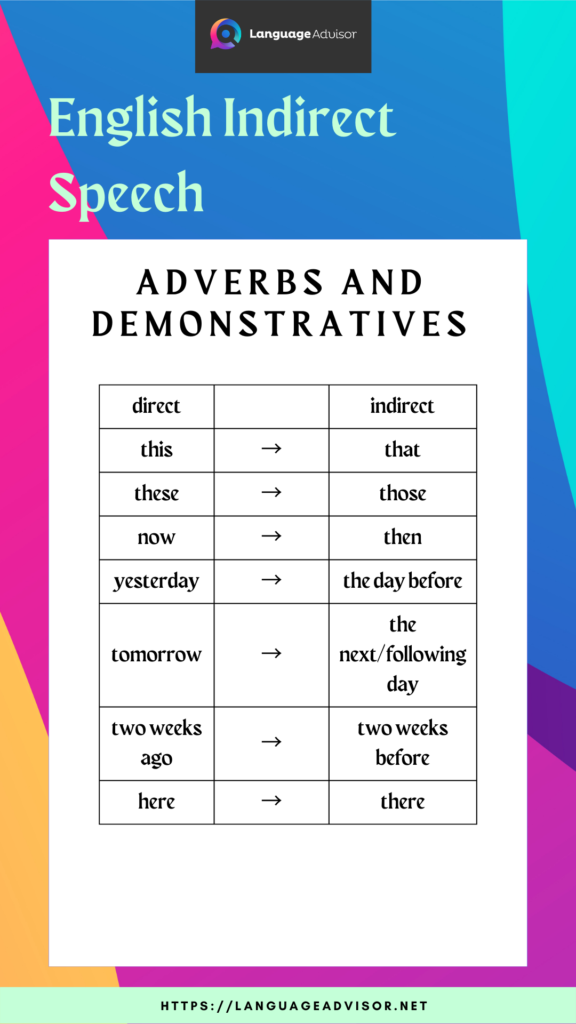

English Reported Speech
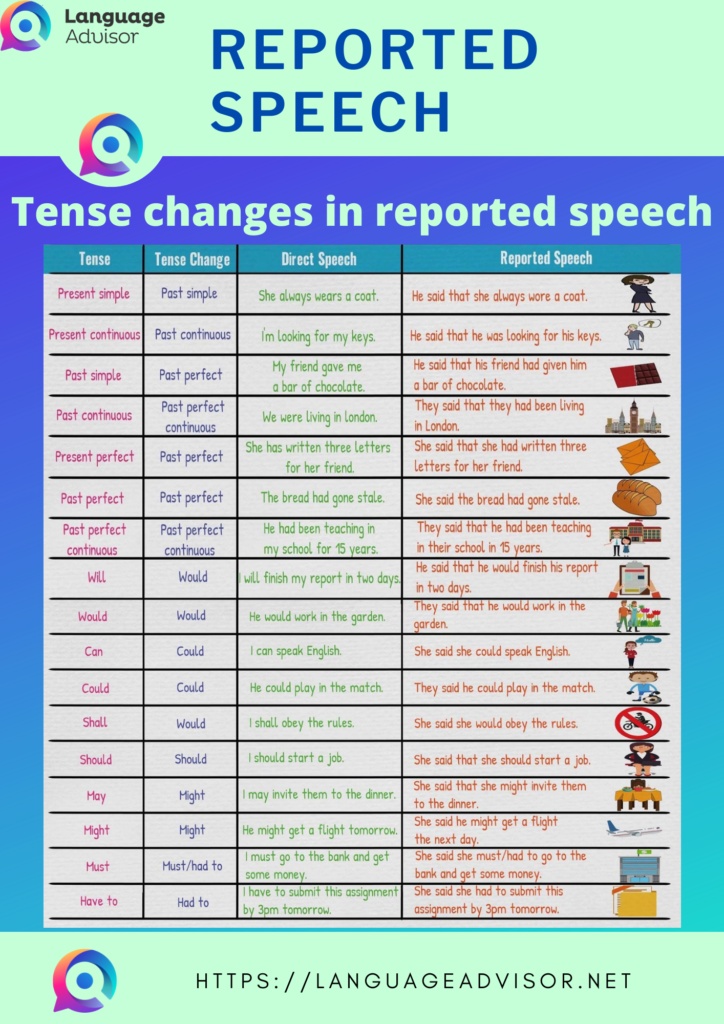
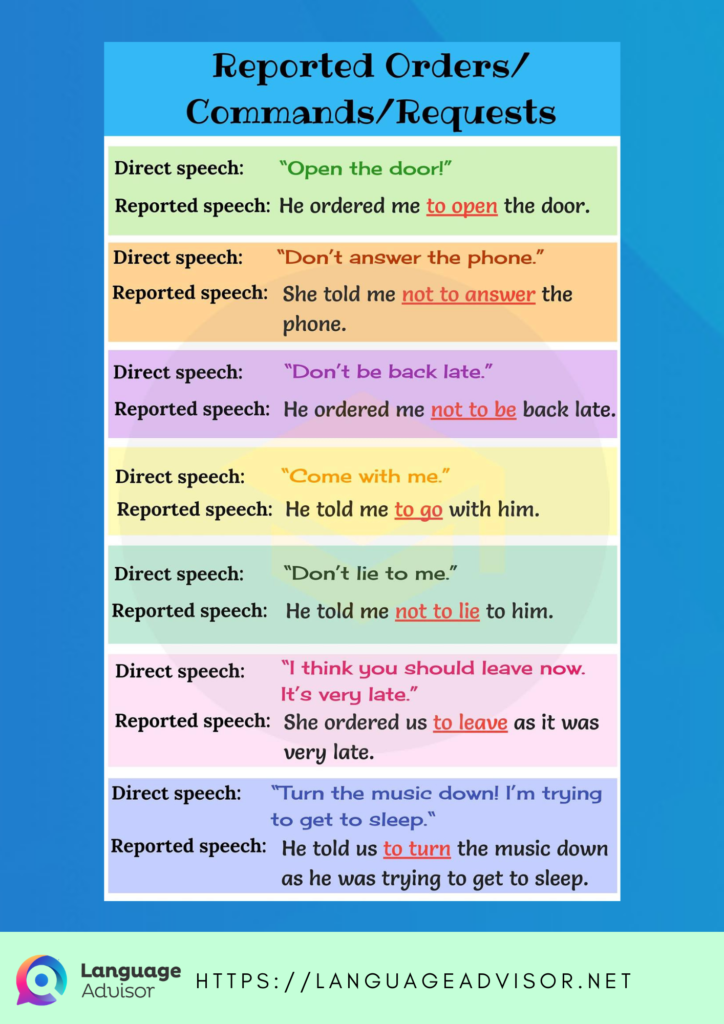

English Indirect Speech
Exercises
EXERCISE 1.
Put the following questions into indirect speech. Remember that you can use either if or whether as link words.
Eg. What time is George coming home?
I wonder what time George is coming home.
What can I eat this evening?
Help me decide ___________________________________________
Why is dad not phoning?
I’d really like to know _________________________________________
Has granny ever been on a plane?
Do you know ___________________________________________
4. Have John and Sally been married for a long time?
I wonder ___________________________________________
5. Where is Andy’s girlfriend from?
I’m not quite sure ___________________________________________
Did I tell you about the other night at Steve’s?
I can’t remember _____________________________________________
EXERCISE 2.
Put the following paragraph into reported speech. Choose some of the following introductory verbs: ASK / ENQUIRE / SAY / TELL / REPLY /ANSWER / ADD.
Claire: “Would you like to go to the cinema on Saturday?”
Bob: “I don’t know… Who’s going?”
Claire: “Well, I’M going! Is it not enough for you?”
Bob: “No, it is no longer enough. I’m sorry, Claire, but I’m going to leave you.”
Start like this:
Claire asked Bob if … _______________________________________________
EXERCISE 3.
Rewrite the sentences in the indirect form.
e.g. John: “We are getting married soon”.
John said they were getting married soon.
Paul: “ We had an accident during our holiday.”
Paul said ___________________________________________
Sandra: “We are going to have lunch.”
Sandra said ___________________________________________
Russell: “I can’t help listening to what they’re saying.”
Russell said ___________________________________________
Patrick: “It’s been a hectic week.”
Patrick said ___________________________________________
Amanda: “We’ve been travelling all around India.”
Amanda said ___________________________________________
Tom: “Joanna is shocked, she can’t even say a word.”
Tom said ___________________________________________
Jennifer: “We had the time of our life in Brazil”.
Jennifer said ___________________________________________
Sam: “Laura must study harder if she wants to pass her exams”.
Sam said ___________________________________________
Claudia: “I think the lesson will probably go on forever.”
Claudia said ___________________________________________
Eric: “Those people behaved so strangely.”
Eric said ___________________________________________
Anna: “I think I’m going to throw up.”
Anna said ___________________________________________
Alec: “She is the most beautiful girl I have ever known”.
Alec said ___________________________________________
EXERCISE 4.
Put the following dialogues into reported speech using the following verbs:
declare say tell agree deny plead demand
Example:
Tony – “I love you Bettie”
Tony declared his love for Bettie.
DIALOGUE 1:
Bettie: Well, I have never loved you.
Tony: But you accepted my proposal of marriage.
Bettie: That was because you were rich. Now you have lost your money I no longer want you.
Tony: I didn’t lose my money, you spent it!
Bettie: It’s over Tony, just accept the fact and move on with your life. I have!
Tony: So you don’t want me back?
Bettie: Never, ever ever.
Tony: That’s a shame. I won the lottery.
DIALOGUE 2:
Judge: so, you were speeding?
Defendant: No sir, not me.
Judge: So, you deny you were speeding?
Defendant: Definitely.
Judge: But the police caught you on camera. How can you deny that?
Defendant: No sir. They have a picture of my car on camera, not me.
Judge: If it’s your car you must have been driving it. Am I correct in thinking this?
Defendant: No sir.
Judge: For goodness sake man; give me a straight answer. Was it you?
Defendant Again. No sir. I sold the car two weeks ago!
EXERCISE 5.
Rewrite the following sentences in reported speech:
e.g. “If you people don’t move that truck from my premises, I will call the police.”
He said that if they didn’t move the truck from his premises, he would call the police.
“What is going on here?”, he asked. “Some sort of party?“, he continued.
“We were just unwinding after a difficult and full–filled weekend of imposed recreation.“, the private replied.
“Well, alright.“ conceded the staff sergeant. “Just try to keep it down ‘cause the captain’s still really upset with you guys about that boiled chicken stunt that you played last week.“
“You can bet your life on that, Sarge!“, the private replied. “We’ll be as quiet as mice and sweet as sleepin’ babes.“, chimed in one of his comrades.
“Just remember to clean up the broken beer bottles before you leave. Don’t leave the place like you did last week.“, the sergeant admonished.
“The United States Government can neither confirm nor deny the sightings of little green men in the Oval Office but we can confirm reports of the existence of intelligent life in those quadrants.“, said the White House spokesman, Ari Fleischer.
“What about rumours of fraternisation between the president’s family and these so–called U.F.O. s ?“, called out the reporter from the Podunk Courier and Feed Guide.
“No comment! “, retorted Mr. Fleischer, icily.
“ Is it true that the President has been sent to the Royal School of Poncy Pronunciation for diction and grammar lessons? “, cut in the man from the New York Times.
“ We can only confirm the existence of fax communications which make reference to a correspondence course. That’s all, gentlemen. The President and I thank you for your time.”, the spokesman concluded.
EXERCISE 6.
Change the following sentences from reported speech into dialogue. While there is much room for interpretation, the verb tenses must be correct:
e.g. He asked what the problem was and why the accounts hadn’t been completed on time.
“What’s the problem? Why haven’t the accounts been completed on time?”
The accountant responded that it had not been her fault if she had not completed the accounts and blamed the whole think on a very irritating noise that had been emanating from the air – conditioning vents.
Mr. Cheese responded that that was a likely story and that he wasn’t going to accept any of it and that if she wanted to keep her job she would have to get down to work in order to complete the work before the office closed for Christmas day.
The cowed accountant accepted this warning telling Mr. Cheese that she would work all night if necessary to finish the assignment.
Mr. Cheese accepted this response but insisted in reminding her that her job was at stake.
The accountant responded that no one knew better than she the risk she ran of losing her job.
Mr Cheese said that it was good that she was aware of the dangers of unemployment and reminded her of how grateful she should be for his clemency and comprehension.
The accountant exclaimed her undying loyalty to him and the company. She then asked Mr. Cheese if she could leave her work station to get a drink of water to which Mr. Cheese consented while commenting that if she must drink water she should try to avoid doing it on the company’s time.
The accountant thanked Mr. Cheese profusely while rushing towards the bathroom door.
On the accountant’s return Mr. Cheese expressed his dismay at the length of time she had spent in the bathroom and chastised her again for her laziness.
EXERCISE 7.Match the sentences in direct speech to the reporting verb and then write a sentence.
It will be necessary to change some words. Do not use all the verbs.
accuse admit advise agree apologise beg complain deny invite offer order promise
e.g. “I won’t go with you”. He refused to go with her.
“Don’t forget to ring me!” ________________________________________
“This soup is too hot”. ___________________________________________
“It’s true. I stole this CD”. _______________________________________
“I’m sorry I said that”. __________________________________________
“Please, please! Don’t kill me!” ______________________________________
“It’s dangerous”. _______________________________________________
“Stop talking”. _______________________________________________
“Okay, I’ll come to the party”. _____________________________________
“Why don’t you try another restaurant”. ______________________________
“I didn’t do it”. _______________________________________________
“You stole the car, didn’t you”. _____________________________________
“Would you like to drop by tomorrow?” _______________________________
“Don’t worry. I’ll do it now.” _______________________________________
“If you don’t pay up, you’ll never see your son alive again.” _______________________________________
INDIRECT QUESTIONS
EXERCISE 1.
Change the sentence to an indirect question as in the example.
e.g. Where does she live? Did I tell you where she lives?
When did he leave home?
Would you tell me _____________________
What are they reading?
How would I know ______________________
How will you get to work?
Can you tell me _______________________
Who killed the man in you room?
Could you find out ________________
What time is the party?
Do you remember _______________________
Should we come early?
Do you know if __________________________
Was anybody else involved?
Can you find out ______________________
Had he been there before?
Can you ask _________________________
Was he alone when he called?
Why do you want to know ______________
Were they accused of the crime?
Who knows ______________________
Did the burglar break in through the back?
How would I know __________
Have they registered under a false name?
How can we tell ____________
How long had they been waiting?
Do you know ______________________
Who does he know who could give some help?
Can you ask _____________
REPORTING SUGGESTIONS, ADVICE, REQUESTS AND COMMANDS
EXERCISE 1.
Use one of the following words to complete the sentences. More than one may be appropriate.
Suggest/ advise/ recommend/ offer/ tell/ warn/order/request/ask/invite/ apologise.
E.g. The doctor advised me to take a week off work.
I was _____________ by the policeman to empty my pockets.
Susan _____________ me that she was getting married.
My presence ___________________ at the conference.
During the game, the referee ________________ him that if he fouled once more, he would be sent off.
George and Stephanie _____________ me to their engagement party but I couldn’t go.
The teacher ______________ for shouting at her students.
My financial adviser ______________ that I bought shares in Microsoft.
She was _________________ not to feed the pigeons.
The government has ____________ small business to prepare for a recession.
EXERCISE 2.
Report the sentences below using the appropriate words from the previous exercise.
E.g. Mother: ”Go and clean your room”.
I was ordered to clean my room.
Doctor: “If you don’t stop drinking so much whisky, your health could be in serious danger”
Anne: “ Would you like to come to my house for dinner tonight ?”
Salesman: “ If you buy one, I’ll give you the second for half price!”
Son: “ Please don’t come to watch me sing mum! I’ll be so embarrassed”.
Fred: “I’m really sorry I forgot your birthday”.

All downloads are in PDF format
BROWSE THE EBOOK ONLINE OR DOWNLOAD THE PDF FOR FREE






